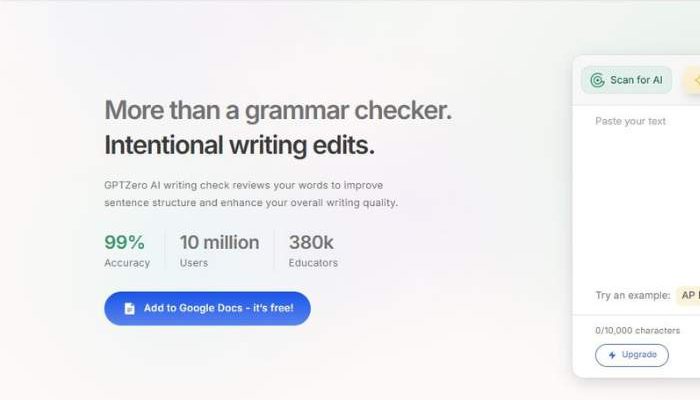
GPTZero Grammar Checker: My Unfiltered Thoughts
GPTZero offers a grammar tool that does more than simple spell checking. The description says it can:
- catch grammar mistakes, typos, missing punctuation, incorrect usage.
- provide feedback not just on small errors, but on clarity, structure, voice, tone. It flags when sentences are wordy or unclear, suggests improvements.
- show suggestions inline (i.e. you see exactly where a comma is misplaced or where a word seems off) and let you accept or reject changes.
- allow you to upload a file or paste the text. Free to start.
- includes a chat-feature / follow-up ability: highlight a sentence/section and ask for more help or clarification.
It also supports feedback beyond just grammar: voice, tone, more polished structure. It tries to be like a coach, not just a proofreader.
Dive into GPTZero Grammar Checker
How It Works (From What I Saw + How I Think It Likely Works)
Here’s a rough breakdown of the process:
- You paste (or upload) your text into their dashboard.
- The system scans line by line to find grammar issues, spelling mistakes, punctuation problems, etc.
- It gives suggestions inline: you see errors highlighted, suggestions offered; you can choose to accept or reject.
- It also offers higher-level suggestions: clarity, sentence structure, possibly tone / voice adjustments. If a sentence is clunky or unclear, it points that out.
- There’s “focused feedback”: you can highlight a part and ask for more details or explanation.
Strengths & What Seems Good (Why You Might Want It)
These are the parts that made me think, “Hey, this could be pretty helpful.”
| Strength | Why It’s Valuable |
| Free / Easy Entry | You can try it without paying, paste something you already wrote. Low friction. |
| Contextual Feedback | It doesn’t just say “comma here” or “typo”; it explains, suggest better phrasing, point out unclear sentences. That helps learning, not just fixing. |
| Voice / Tone / Structure Help | For people who care about not just being correct, but about sounding good, sounding human—this helps shape style. |
| Accept / Reject Suggestions | You’re in control. If a suggestion doesn’t match your style, you can skip it. That’s good, because I hate when grammar tools force changes that kill voice. |
| Follow-Up Clarifications | Want to know why a suggestion was made? The highlight + chat/feedback feature gives you that, rather than leaving you guessing. |
Discover GPTZero Grammar Checker
Weaknesses / What Might Bug You
No tool is perfect. Here are the parts you’ll want to watch out for.
- Sometimes suggestions might feel too “safe” or generic. In trying to correct, the tool might trim voice, or make things a bit bland. If you like flair or informal style, some suggestions might annoy you.
- For non-native English writers or people using idioms/slang, grammar checkers often misfire: suggestions that are grammatically “correct” in standard form may not fit your intended expressiveness.
- Limits: Free usage might have caps (word-limits or usage per time), though the site says it’s free to try. If you write long content a lot, you may hit those limits.
- Sometimes “structure / clarity” feedback may require more rewriting than you expect. If you’re in a hurry, you might skip those; but then you miss some of the benefit.
- Machine suggestions still can misinterpret meaning: if your sentence has nuance, irony, or you want ambiguity, the checker might push you to eliminate those, which might reduce your intended effect.
Who It Seems Best For (and Who Might Not Love It)
If I were you, I’d consider:
Good fit if you:
- write often (blogs, essays, reports) and want to polish up writing quickly
- like feedback, want to learn / improve, not just correct
- care about sounding more professional or clearer
- don’t want to pay a lot before knowing how useful the tool is
Might not love it if you:
- write poetry, creative / experimental prose (where “rules” are sometimes to be broken)
- use very informal / slang / dialect heavily — might get suggestions that try to normalize or standardize too much
- you need super-tight academic or legal style and precision beyond general grammar + clarity; might need specialized editors
My Personal Opinion
I like this tool. It strikes a nice balance between helpfulness and letting your own style survive. It doesn’t try to replace you; it tries to elevate what you wrote.
When I type something casually and want it to be sharper, this kind of tool helps me cut out fluff, fix stumbles, polish commas without killing what made the draft interesting.
What I worry slightly about: letting it do too much. If I accept every suggestion blindly, I might lose what makes me me in writing.
Also, tools evolve: what seems excellent now may have quirks later, especially if people exploit “acceptable errors” or style-looseness to fool checkers, etc.
Would I Recommend You Try It?
Yes. I think you should try it. Especially since there’s a free version / free-to-try. Very low risk, good potential gain.
If you try, here’s how to get the most out of it:
- Start with something you already wrote. Paste it, see what kinds of errors or suggestions it gives. Pay attention which suggestions feel right vs wrong.
- After applying suggestions, read aloud or proofread to catch places where suggestions may have changed tone or voice.
- Use the “focused feedback” / highlight-and-ask feature when you don’t understand a suggestion. Helps you learn.
- Combine with your own read: grammar + meaning + voice. Don’t let it overwrite what you meant.





















